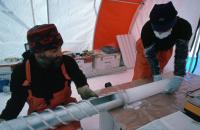One of the more popular excuses right now among those who still seem to think global warming is a “myth” made up by left-wing scientists and an underground network of communist politicians, is the fact that in the earth’s long history scientists have observed that increases of CO2 in our atmosphere have lagged behind rises in temperature.
This is in the minds of many, including climate science “experts” like John Stossel at ABC News , puts to rest the whole idea that CO2 has anything to do with temperature.
Question: if John Stossel and others are so certain that this temperature/C02 lag somehow brings into question the theory of global warming, wouldn’t scientists have heard of this and have accommodated for it in their research?
Answer: of course they have.
I asked one of the top climate scientists in the world, Dr. Andrew Weaver from the University of Victoria, to explain the fact that C02 lags behind temperature rise.
Turns out that the answer is quite simple.
It also turns out, that Dr. Weaver is putting the finishing touches on a new book called Keeping our cool: Canada in a warming world, and he has a whole section on the very topic of C02/temperature lag that he kindly sent on.
Here’s Dr. Weaver’s simple explanation excerpted from his new book:
“Antarctic ice core records also contain valuable information regarding the relationship between temperature and the greenhouse gases carbon dioxide and methane.
It’s only during the slow deglaciation process, however, that sufficient resolution is available to allow scientists to explore the statistical relationship between temperature and carbon dioxide.
Several groups around the world have independently examined a number of different Antarctic ice cores and found that during deglaciation, the local changes in Antarctic temperature led changes in carbon dioxide by about 800 ± 600 years.
That is, temperatures changed first and then greenhouse gas levels followed, precisely as one would expect.
The greenhouse gases act to amplify the otherwise small changes in seasonality associated with very long timescale variations in the Earth’s orbital configuration.
Feedbacks, like those I discussed earlier in this chapter, act to amplify the level of carbon dioxide, methane and water vapour in the atmosphere. These cause further warming.
So the next time you hear your favourite global warming naysayer point out that carbon dioxide lags temperature by 800 years in the glacial record, don’t be surprised. That’s exactly how it must be.
There were no coal burning plants 21,000 years ago spewing carbon dioxide into the atmosphere.
Carbon dioxide levels increased in response to warming thereby amplifying this warming further.
Remember that changes in the Earth’s orbital configuration affect seasonality, and not the total amount of radiation the Earth receives from the sun in any given year.
By itself, a change in the Earth’s orbital configuration does not cause global warming or cooling; the small signal must be amplified, and this is precisely what changes in surface albedo, carbon dioxide, methane and water vapour do.
That is, it doesn’t matter whether you put carbon dioxide in naturally or unnaturally, the fact remains that it is a greenhouse gas and traps outgoing longwave radiation.
And, we’ve known this for over 100 years. Cold climates can’t be maintained without a depletion of greenhouse gases and warm climates can’t be maintained without an excess of greenhouse gases.”
Subscribe to our newsletter
Stay up to date with DeSmog news and alerts







